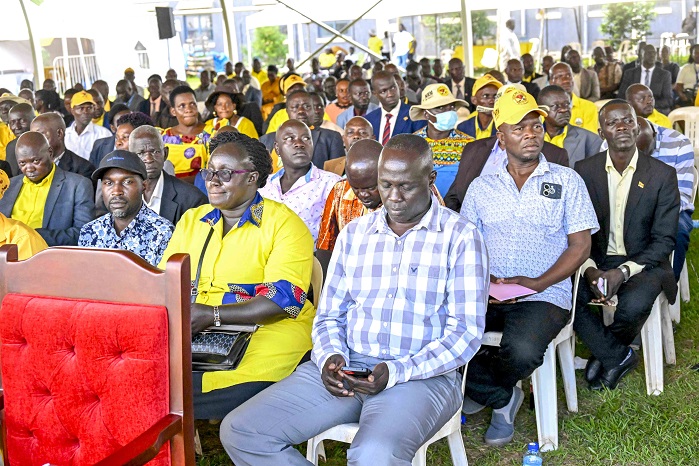
The body of the former minister Henry Kyemba being delivered to Parliament as state funeral kicked off. MPs later paid their respects to the former legislator
Kampala, Uganda I HABARI DAILY I
Uganda recently bid farewell to one of its most notable political figures and a staunch advocate for democracy and human rights, Henry Kyemba. The nation paused to honor his legacy as Deputy Speaker Thomas Tayebwa led Parliament in paying tribute to the former Minister in Amin’s government, recognizing his exceptional service to the country with unwavering dedication.
Henry Kyemba’s contribution to Uganda extended far beyond the confines of traditional politics. He was a man of many talents, serving humanity in numerous capacities, even as a dedicated Rotarian. His life was marked by a commitment to improving the lives of Ugandans and documenting the nation’s history to ensure that future generations could better understand their origins.
Tayebwa, during the tribute, emphasized the pivotal role Kyemba played in exposing the atrocities of the Idi Amin regime. His efforts mobilized countless individuals to end the brutality inflicted upon Ugandans, making him a hero in the eyes of those who sought justice and truth.
First Deputy Prime Minister Rebecca Kadaga, representing the government, echoed the sentiments of many by hailing Kyemba as an industrious leader who played an immeasurable role in shaping Uganda’s destiny. His unwavering dedication and patriotism were evident throughout his life, making him a symbol of hope for the nation.
Born on December 8, 1939, in Mayuge district, Kyemba’s journey through Uganda’s political landscape began at a young age when he was appointed as Assistant Secretary in Charge of Ceremony and Protocol. However, his relationship with the nation’s leadership, notably Milton Obote, began years earlier during their time at Busoga College Mwiri in the mid-fifties.
Kyemba’s transition from a civil servant to an accidental politician was marked by his impeccable qualifications, having obtained a Bachelor’s degree in History from Makerere University. His appointment to various positions, including Permanent Secretary and Health Cabinet Minister during Idi Amin’s administration, showcased his adaptability and dedication to serving the nation.
Colleagues who worked closely with Kyemba described him as shrewd, intrepid, and possessing high emotional intelligence. His ability to navigate relationships with individuals from diverse backgrounds was exceptional, notably his adept handling of Idi Amin during a tumultuous period in Uganda’s history.
The turning point in Kyemba’s life came during a delegation to Singapore with Obote in 1971 when they received the shocking news of the coup that had overthrown their leadership in Uganda. Following a brief period in exile with Dr. Obote in Tanzania, Kyemba returned to Uganda under the leadership of Idi Amin, who promptly instructed him to resume his duties as Principal Private Secretary.
As events unfolded during the Amin regime, Kyemba found himself in a unique position. He was among the first government officials to disclose the suspicious deaths of hundreds of Ugandans, including the Archbishop Janan Luwum and ministers Erinayo Wilson Oryema and Charles Oboth Fumbi.
His book, “A State of Blood,” challenged the official narrative, asserting that these deaths were not accidents but the result of brutality, as the bodies were riddled with bullets.
Kyemba’s educational background further attested to his dedication and commitment to knowledge. He held a master’s degree in history from Northwestern University, Evanston, and a Certificate in African studies from the same university. Additionally, he obtained an Honors degree in history from London University, showcasing his continuous quest for learning and understanding.
Henry Kyemba’s life story is one of unwavering dedication to Uganda and its people. His legacy lives on as a reminder of the importance of individuals who courageously advocate for justice, democracy, and the truth. He will forever be remembered as a remarkable figure in Uganda’s history, a man who documented the nation’s past, and as an inspiration for future generations to continue the pursuit of a better Uganda




